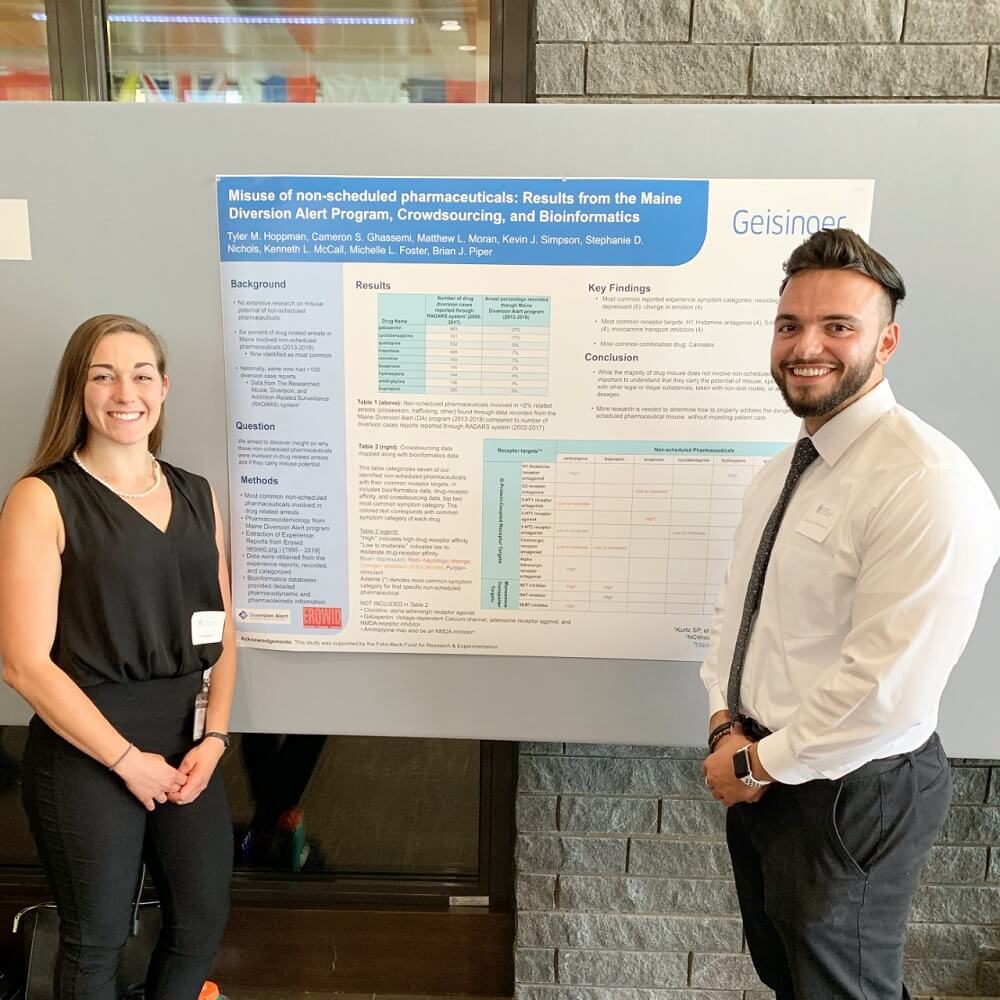Cataloging the Misuse of Non-Scheduled Pharmaceuticals
Using the Maine Diversion Alert Program, TouroCOM Middletown Student Cameron Ghassemi Examined State Arrest Records For Connection Between Incarceration and Drug Use

Does the misuse of legal pharmaceuticals lead to arrest?
This was the question that TouroCOM Middletown student Cameron Ghassemi, together with a fellow medical student from Geisinger Commonwealth School of Medicine, spent the summer trying to figure out.
Ghassemi and his study partner, Tyler Hoopman, used the Maine Diversion Alert Program, a database that chronicles all arrests made in Maine along with any relevant drug use cataloged during the arrest. Launched in the wake of the opioid crisis, the database provides access to drug arrest data for healthcare providers.
“There’s a lot of research on scheduled pharmaceuticals,” said Ghassemi, referring to drugs that are either banned by the government or allowed for specific cases. “Scheduled pharmaceuticals—like opioids—have the potential to be misused. They’re highly addictive. Non-scheduled pharmaceuticals, legal drugs and medications, also have the potential to be misused and we were trying to determine if there was a misuse and some of the possible consequences.”
Of the 11,500 entries in the database, Ghassemi discovered that roughly six percent of the entries were arrests where a person had used a non-scheduled pharmaceutical. Of those, the most common drug found in the arrest were gabapentin, a drug used to treat seizures, at 23 percent of the arrests, cyclobenzaprine, a muscle relaxant, at 11 percent, and trazodone, an anti-depressive, at seven percent.
While Ghassemi was quick to note that correlation did not equal causation, he sought to understand the possible consequences of the misuse or combination of these drugs. For the second part of the study, Ghassemi and his partner searched through thousands of posts on the website Erowid, where users describe their experiences on a variety of drugs.
“Users wrote about their experiences with drugs or with a combination of drugs, typically cannabis and some other opioids,” said Ghassemi, explaining that the drug with the most amount of entries on Erowid was cannabis. After cross-referencing Erowid with their findings on the Maine Diversion Alert program, the two came up with three categories of the possible impacts from the non-scheduled drugs: neurological change, depressants and changes in emotion.
“Our purpose was to take a look at why these types of drugs—anti-depressants, or sleeping pills—are they a factor in arrests?” Ghassemi stated. “We were wondering if non-scheduled pharmaceuticals are having an effect, perhaps either by being over prescribed or being given an unnecessarily high dosage.”
A third part of their study examined which receptors were affected by the drugs in question.
“This was a new experience for me,” said Ghassemi. “I’ve worked in a lab and done benchwork, but this was more number-crunching and setting up excel spreadsheets. It was exploring an unknown area for me, but after a while I became comfortable. It was interesting to see a different side of research.”
Ghassemi and his co-author delivered a poster-presentation at Geisinger Commonwealth School of Medicine and plan to expand their study and develop a manuscript based on it.
In addition to his research, Ghassemi spent part of his summer travelling with his family and girlfriend. Ghassemi also maintains a popular Instagram page where he discusses health tips and dispenses medical school advice. Two of his advisees joined him in TouroCOM Middletown as members of the class of 2023.

